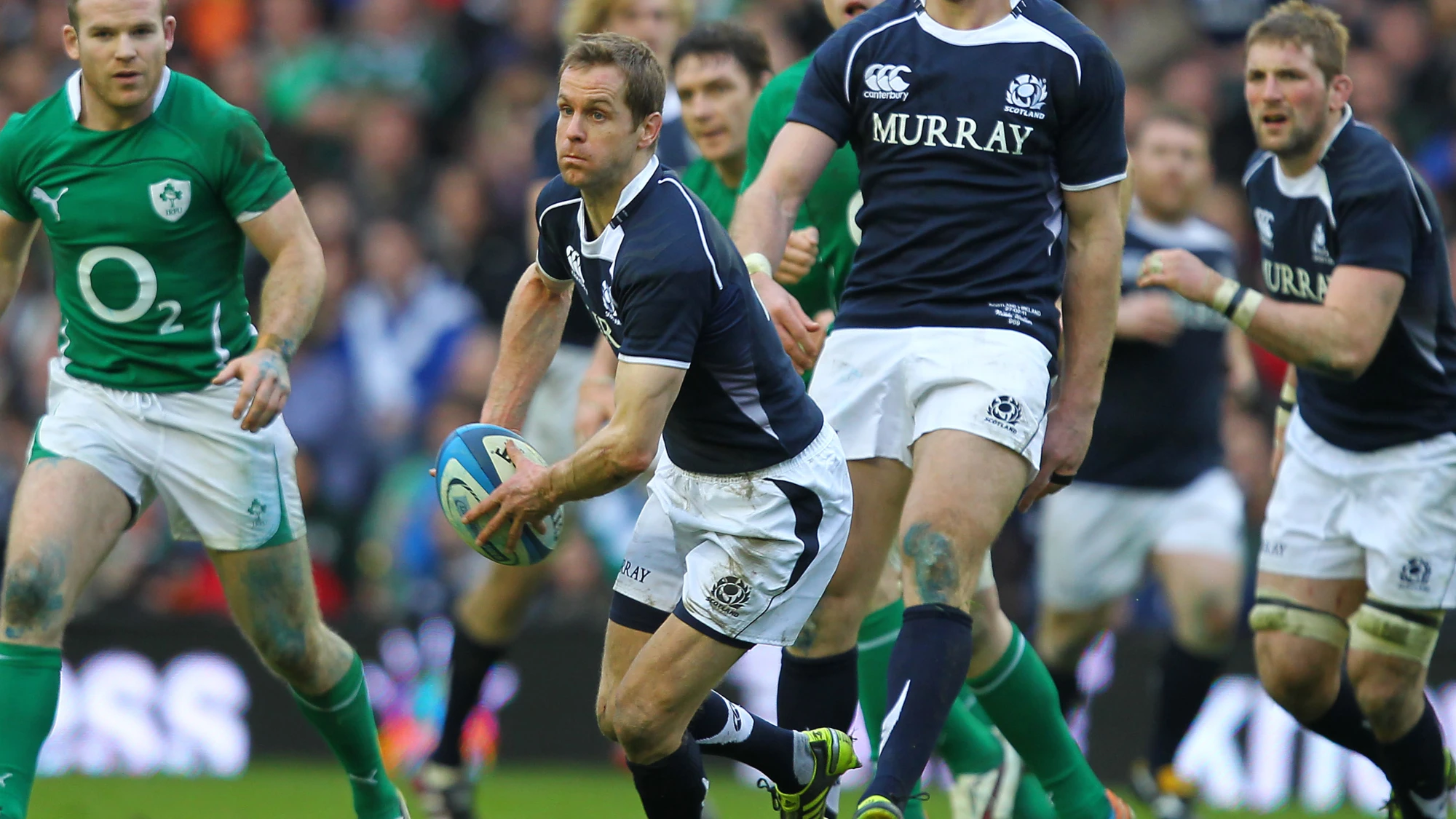As a player Chris Paterson was always more reliant on brains than brawn so it should come as little surprise that since hanging up his boots, he has become one of the more considered thinkers of the game.
Scotland’s all-time record points scorer and, at the time of his retirement, record appearance maker, now works as a specialist skills coach for the SRU.
His role involves working on both goal-kicking and kicking from hand across the board, from the national team to the academies, Scotland Women and age group and even the two Guinness PRO14 sides. In the modern game, where kicking has taken on an outsize importance, it is a hugely influential role.
It is a job that appealed to Paterson, who grew up being coached by legends of Scottish rugby like Sir Ian McGeechan, Jim Telfer and John Rutherford. It was they who influenced his own philosophy and desire to help people acquire and develop a skill, and for the man who initially trained to be a PE teacher before committing to professional rugby, it is a role that fits perfectly.
Kicking after all, was one of Paterson’s greatest strengths as a player, although as he is quick to stress, there was much more to his game and in fact it took more than 25 Tests for him to establish himself as his country’s front-line kicker.
Before that, Paterson had left those duties to others as he tried to find his feet at international level. He was thrust onto that stage at 21 in a World Cup, making his Six Nations bow the following spring before he had turned 22.
Paterson had grown up playing fly-half but was shifted to full-back by McGeechan, conscious even then of the need to protect one of the more sleight members of his team.
Not that Paterson was spared from the physical nature of Test rugby in his first taste of the Championship. Brought in to take on a formidable France team in Round 3 of the 2000 Six Nations, Paterson recalls preparing for his first high ball of the game.
He said: “I remember my first Six Nations game was against France and Gérald Merceron was at ten for France. It’s a classic, new full-back, get the ball up in the air to test him out. I remember being so focused, all I could think about was what the parents have said, what coaches have said, what teachers have said ‘Keep your eye on the ball’. You know what’s coming, the French are going to test you, you’re going to get thumped. So keep your eye on the ball.
“Sure enough Merceron put this high ball up and all I could think was keep your eye on the ball and catch it. I actually took it but I ran into the upright post pad at the same time. So I had my eye on the ball and a completely clear head but I didn’t realise there was a massive post pad, so I smashed into that, somehow kept hold of the ball and get it away into touch.
“It shows you that even with everything going on, you can still focus on the precise thing that you want to the detriment of my pride when I went flying into the post pad but luckily I kept hold of the ball.”
SECOND PLAYMAKER
While Paterson was moved to full-back, McGeechan wanted him to use his experience at fly-half to shape the way he played.
That Scottish team was notable for regularly starting a back three all of whom could play at full-back, in the form of Paterson, Kenny Logan and Glenn Metcalfe.
Two decades later, it is a tactic that has become popular once again with the increased focus put on tactical kicking.
For Paterson, the option to slot in as a second playmaker was a responsibility he relished.
“We were encouraged even then to come in at first receiver if there was a midfield breakdown. Whoever was at standoff, you’d make sure you went to the other side so you had a two-sided attack so it was a free reign in some ways and I loved it because it was further away from the front line and it gave you more time on the ball to get up to speed, with how little time you get in international rugby.
“So it was great and I loved playing with that three full-back role that Geech wanted us to do. I got a lot of good experiences. I saw myself as guy who enjoyed rugby and would like to try and make the right decision at the right time and would try and create space rather than run into where there was none. It didn’t always happen.
“But I’d say I was a bit of an old-fashioned player, whereas now players have exceptional skill level and talent but are perhaps a little bit more specific in their role. It’s only 10 or 20 years ago when I played but we had more flexibility because the game plan was less structured and it allowed the decision makers on the field to make more decisions.”
UNPREDICTABILITY
If 2020 was marked by a very structured game plan and tactical kicking proving the most effective tool, Paterson is hopeful that the game may evolve this year.
This Saturday Scotland will look to achieve something that Paterson never achieved in his international career, winning at Twickenham.
His 84 points are the most scored by a Scottish player in the 150-year history of meetings between the sides but all three of his Calcutta Cup wins came in Edinburgh.
He is very much aware of the challenge that awaits Gregor Townsend’s team, even without the factor of the Twickenham crowd.
And yet for Paterson, perhaps not surprisingly when you consider his approach as a player, it is unpredictability that could be the next point of difference within the game.
He explains: “It’s probably always been the case but it’s probably highlighted more at the moment with the understanding opposition teams have of how you play and how everybody else plays is so clear. There are so many quality brains involved in analysis and preparation.
“There aren’t many surprises in international rugby now. That’s maybe because it’s really hard to do, or maybe because everyone does quite a similar thing and I think you need that baseline of security that comes from your set-piece.
“The success in the near future is probably going to come through unpredictability. International rugby, you don’t get the time together, so it can be predictable. There’s still an unbelievable level of skill and application but we don’t see a lot of trial and error. I know that sounds flippant, and it’s easy to say we don’t see trial and error. But sometimes error doesn’t have to follow trial.
“You can surprise defences, you can do something the defence doesn’t expect and catch them out a little. With the nature of the players you have in Scotland, you’ve got that. All teams have it but it’s whether all teams are prepared to add that little element of risk when there is so much riding on it. I would like to think it’s less risky because it means you are looking for an attacking edge rather than a defensive mindset, but it’s easy for us to say.”
CONQUERING TWICKENHAM
Eddie Jones has spoken of evolving the style of his England team, although Paterson would be surprised to see that happen this weekend in the Guinness Six Nations opener.
But while Scotland’s wait for a win away to the Auld Enemy now stretches back 38 years, he recalled that he relished the opportunity to play at Twickenham.
He said: “I assume if you ask a lot of players and the perception if you ask a lot of Scotland players, is that they don’t like playing at Twickenham. I loved it because there was an added aura around the Scotland-England games, be it home or away and I just loved the sense of opportunity that you had, that you could try to do something special to beat such a strong team in such a strong environment, up against it.
“I loved that, I used to stand in the middle of the field and laugh to myself, thinking this is great. I never came out on the winning side of it and 2011, one of the most memorable things was the openness of the game, apart from the fox running about in the stand at the start of the game, during the anthems.
“It had an open nature to it, similar to 2005 when we played down there in the last game of the Championship. It was quite unique because most of the England games were so tense and so close, maybe not the score always but in terms of how the game was played. Those two games were far more open and expansive and I think that suits Scotland.
“It’s hard to do that now against England because they are so demanding and their defence is so strong and they kick and strangle you and their chase is excellent but if we could get to that stage where it is quick and unpredictable and you’re accurate, I think that gives us the best chance of winning international games, be it against England or anyone. 2005 was a personal highlight in terms of how it went and my involvement and very similar in 2011.”
That expansive game in 2011 was the closest Paterson came to winning at Twickenham, with Tom Croft’s try proving the difference in a 22-16 defeat.
Scotland came even closer two years ago in the crazy 38-38 draw. It is no coincidence that those two games were among the more open Calcutta Cup meetings of recent times.
If this weekend has another cracker in store, then Paterson’s desire for unpredictability and Scotland’s ambition to end their wait for a Twickenham success may both come to fruition at the same time.



